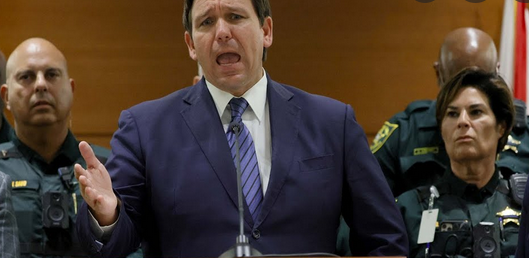Photos: YouTube
In 2020, Gov. Ron DeSantis bragged that Florida’s elections were the “gold standard.” That was an exaggeration, but he was right in one sense: the elections there, as in the rest of the country, were secure and not marred by fraud.
That left DeSantis with a dilemma in his shadow race against Donald Trump for the GOP presidential nomination. How to prove that he, too, could recklessly undermine democracy? His answer was an election crimes police squad, announced last year to great fanfare.
Did it discover Italian spy satellites switching votes? Dominion machines using ballots made in China? Bushels of ballots?
No — it discovered voters caught in the act of voting.
Rather than identifying some shadowy network of deep state operatives, state election police have found a tiny handful of people, many of whom were themselves victims of government incompetence.
Who could ever have imagined such a thing? Well, lots of people — including the Brennan Center and other voting rights advocates.
Florida’s felony disenfranchisement system was a notorious remnant of Jim Crow. It barred people who had a felony conviction for voting throughout their entire lifetimes, keeping 1.7 million otherwise eligible people from exercising their citizenship rights. In 2018, a sizable majority of Florida voters enacted Amendment 4 to end that system. The Brennan Center proudly helped draft the amendment and participated in the campaign to pass it.
Then the Florida Legislature stepped in.
It undermined the law, requiring citizens who had just had their rights restored to pay off fines and fees before voting. We took the state to court, warning that the new requirement would lead to chaos. There was no way for people to know if they were eligible to vote. We lost that case, and now Florida is living with that chaos.
Consider the story of Kelvin Bolton, (above) as documented in ProPublica and covered here at the Brennan Center. In 2018, after Floridians overwhelmingly approved a ballot initiative to restore voting rights to most people with past convictions, the Alachua County Supervisor of Elections sent officials to county jail to help inmates register for the next election. Kelvin Bolton proudly signed up along with other people in exactly the same situation. According to Bolton, the officials failed to tell him about the requirement that he pay outstanding fines and fees.
Even if Bolton had known, there was very little he could have done. There is no centralized database you can use, no number you can call, to find out whether there are outstanding fees. Here’s an indication of how maddening the process is: When the Brennan Center was developing a resource for people attempting to restore their voting rights, we quickly determined that it had to be aimed at lawyers. No layperson could reliably navigate this Kafkaesque labyrinth. And yet, DeSantis and his election police apparently take the position that formerly incarcerated Floridians vote at their own risk.
And, despite its obligation to do so, the state of Florida will not lift a finger to help. The government simply allows (and sometimes encourages) people with felony convictions to register to vote, then prosecutes them when it realizes they have outstanding court debts.
That’s what happened to Kelvin Bolton. Now he faces years in prison and — you guessed it — thousands of dollars in fines. He is determined to fight the charges, but many others pleaded guilty and accepted losing their voting rights yet again.
Election police squads were pointless from the beginning. Voter fraud is extremely rare, and there is no reason whatsoever to believe that that minuscule number of cases have any partisan lean. Voter fraud didn’t decide the 2020 election, and it won’t decide the 2024 election.
But prosecuting people like Kelvin Bolton shows that Florida’s focus on election crimes is worse than pointless — it’s dangerous. It persecutes people who were only attempting to participate in our democracy as full citizens. It also intimidates and deters eligible voters who fear that the election police will come for them, too. All in the name of proving that there is in fact fraud happening, to give credibility to those who have staked their political careers on its existence.
By Michael Waldman\Brennan Center


















